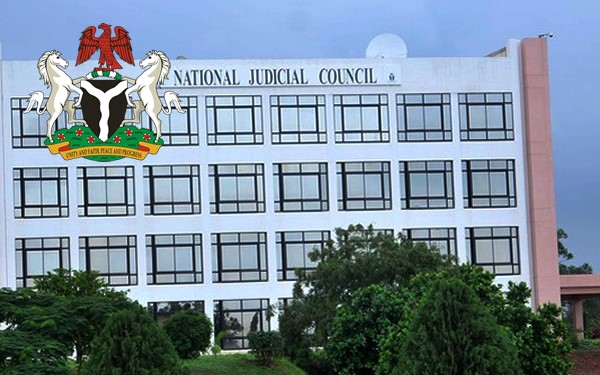The Federal Government Monday challenged the powers of the National Judicial Council, NJC, to interfere in the ongoing criminal proceeding it initiated against Justice Sylvester Ngwuta of the Supreme Court, before the Code of Conduct Tribunal, CCT, in Abuja.
Federal government had in a 10-count charge marked CCT/ABJ/01/17, alleged that apex court jurist had between June 2, 2011 and July 19, 2016, refused to declare his ownership of 28 plots of land to the Code of Conduct Bureau, CCB.
It accused Justice Ngwuta who is also facing another 18-count criminal charge before the Federal High Court in Abuja, of engaging in private business as a public officer, contrary to Section 6(b) of the Code of Conduct Bureau and Tribunal Act.
Government alleged that Ngwuta’s refusal to declare his assets as a public officer was contrary to section 15 of the Code of Conduct Bureau Act, Cap C15 Laws of the Federation of Nigeria 2004 and Punishable under Section 23(2) of the same Act.
At the resumed proceeding on the matter on Tuesday, Mr. Abey Mohammed, SAN, government lawyer, urged the tribunal to dismiss a motion the embattled jurist filed to oppose his trial.
Ngwuta had in his motion dated January 9, queried the jurisdiction of the tribunal to try him over charges he said were grossly incompetent.
He argued that by virtue of sections 318, 158(1) and Paragraph 21 (B) of the 3rd Schedule to the 1999 Constitution, the CCT, lacked the requisite jurisdiction to hear and determine the case against him.
The embattled jurist, through his team of lawyers led by Chief Mr.
Abey Mohammed, SAN, and Kanu Agabi, SAN, a former Attorney General of the Federation and Minister of Justice, contended that allegations against him were never referred to the NJC before the criminal charge was entered against him.
Ngwuta claimed that as a serving judicial officer by virtue of his appointment into the Supreme Court bench, FG, ought to have inline with section 158 of the constitution, allowed the NJC to firstly exercise its disciplinary powers regarding all the allegations in the charge.
The jurist further drew the attention of the tribunal to a recent decision of the Court of Appeal in the case FG instituted against Justice Hyeladzira Nganjiwa of the Federal High Court, wherein the appellate court held that serving judicial officers could not be prosecuted for judicial misconduct or breach of trust, without prior investigation by the NJC.
He insisted that allegations that culminated to the charge against him were never referred to or determined by the NJC.
However, Federal government, in a written address it filed in opposition to Ngwuta’s motion, maintained that the tribunal had powers and jurisdiction to try the case before it.
Federal Government stressed that powers the constitution conferred on the CCT, made the Court of Appeal judgement in Nganjiwa’s case, inapplicable to the charge against Ngwuta.
It told the tribunal that some “sorrounding circumstances” made Ngwuta’s case peculiar.
“The case before this tribunal is an exception because under section 158(1) of the 1999 the powers vested on this tribunal are similarly vested on the NJC, making such powers mutually exclusive.
“The NJC cannot interfere on matters that this tribunal is vested with the power to try. They cannot and they should not interfere.
“The applicant is being tried as a public officer and not as a judicial officer. He is not charged for violating his oath of office as a judicial officer, but for violatiing the code of conduct for public officers.
“My lord, Part 2 of the 5th Schedule of the Constitution makes even Justices of the Supreme Court subject to the powers of this tribunal as public officers.
“Moreover, the defendant is before this tribunal, not as a Justice of the Supreme Court, but as a public officer who we have said had in the discharge of his functions, breached the code of conduct for public officers.
“The toga of the Supreme Court stays with him outside this tribunal. This tribunal cannot be controlled or its powers interferred with by the NJC”, FG’s lawyer argued.
The prosecution equally noted that the appellate court’s decision in Nganjiwa’s case has not been affirmed by the Supreme Court.
“We are very positive that that decision will be voided by the apex court”, the prosecution added, even as he contended that the CCT has unlimited exclusive jurisdiction to try Ngwuta without NJC’s intervention.
“This court cannot at the end of this case recommend the removal of the defendant if he is found guilty, that is the power vested on the NJC. However, this tribunal can order forfeiture/seizure of assets owned by the defendant.
“Unless the constitution is amended, that decision of the court of appeal cannot be binding on this tribunal. This is however not to say that judgement of the appellate court is not binding on the CCT, what we are saying is that the decision in the relied case is not binding”,
Mohammed, SAN, submitted.
After they had listened to both sides, Mr. Danladi Umar-led two-man panel tribunal which initially stood down the case for 30 minutes to deliver its verdict, subsequently deferred ruling till March 21.
It will be recalled that the tribunal had last Wednesday, threatened to strike out charges against Ngwuta for want of diligent prosecution.
The panel observed that the case suffered series of adjournments at the instance of the prosecution.

